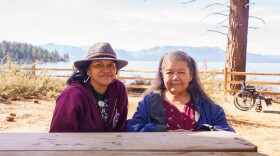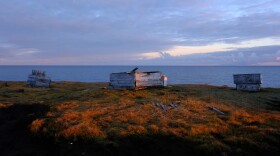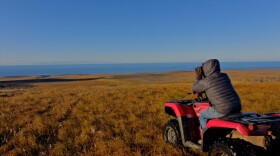-
In southern Oklahoma, the Chickasaw Nation is planting trees to combat climate change. The project is also ensuring that Chickasaw culture gets passed down to the next generation.
-
Researchers from the University of Hawaiʻi at Mānoa are using Okinawan songs to learn about climate and geology. Our Living Lands Producer Daniel Spaulding spoke with Justin Higa, a postdoctoral fellow and a Ryukyuan traditional music practitioner, about the connections between climate, music, and culture.
-
Across the country, Indigenous communities are facing increasing levels of food insecurity. In response, tribes are stepping up their food sovereignty efforts.
-
The Washoe people believe the Tahoe Basin is the spiritual center of their world. They only have limited access to its shores but grassroots nonprofit aims to change that, healing both land and people.
-
Alaska Desk reporter Alena Naiden spoke to Our Living Lands Producer Daniel Spaulding about her reporting from Savoonga on the effort to preserve traditional ice cellars, climate change’s impact on subsistence and more.
-
Climate change has threatened subsistence practices in the Arctic. Alena Naiden reports how one village in Alaska is trying to transform reindeer herding practices into a sustainable business.
-
The Miccosukee Tribe has faced climate change on their lands in the Florida Everglades. Now they are fighting a federal immigration detention center.
-
Data centers are powering a technological boom but they also use a lot of water. Our Living Lands Producer Daniel Spaulding spoke to Kaleb Roedel about his reporting on the Pyramid Lake Paiute Tribe's concerns about a data center near their reservation.
-
Amy Bowers Cordalis is a Yurok attorney who has fought to protect her people's land, water, and way of life. Our Living Lands producer Daniel Spaulding spoke to Cordalis about her new book, The Water Remembers.
-
Climate is impacting Indigenous communities in the Pacific. Our Living Lands Producer Daniel Spaulding spoke to Anita Hofschneider, a reporter who covers issues including sea level rise, fires and storms.

Play Live Radio
Next Up:
0:00
0:00
Available On Air Stations










